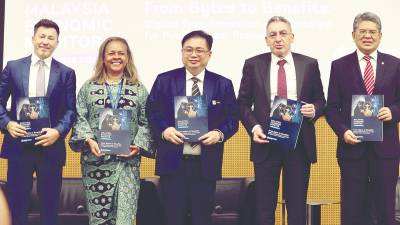KUALA LUMPUR: Malaysia is well-positioned to lead the region in Government Technology-driven (GovTech-driven) productivity, and the country is setting an example for the region on how the push for digital government can drive productivity and build trust between citizens and government.
World Bank division director for the Philippines, Malaysia and Brunei Zafer MustafaoÄŸlu said the focus on digital transformation comes as Malaysia’s economy shows resilience amid global headwinds.
“While domestic demand remains strong, external risks weigh on exports, making reforms such as GovTech critical to boost productivity and sustain the country’s high-income ambitions,“ he said at the launch of the World Bank’s latest Malaysia Economic Monitor report titled “From Bytes to Benefits: Digital Transformation as a Catalyst for Public Sector Productivity” today.
Notably, Malaysia has formally launched GovTech Malaysia as a central pillar in its digital transformation initiative, aiming to modernise public service delivery and standardise digital experiences across government platforms.
One of the key components is the Malaysia Design System (MyDS), which ensures consistency and usability across government websites and apps.
Under the MyDIGITAL agenda, the government is introducing chief digital officers in ministries and promoting the adoption of shared digital infrastructure to reduce duplication and enhance efficiency.
In parallel, the GovTech Innovation Skilling Pilot Programme under MyDIGITAL fosters tech skills among public servants to better implement and maintain GovTech solutions.
To support the broader digital economy, Malaysia is experiencing massive digital investment inflows, with approved digital investment reaching RM66.22 billion in the first half of 2024 alone, surpassing the total for all of 2023.
Finance Minister II and Economy Minister Datuk Seri Amir Hamzah Azizan, in his virtual speech, said digitalisation will play a pivotal role in enhancing the efficiency of public institutions, improving the accessibility and delivery of government services and unlocking new avenues for economic productivity and innovation.
“In cognisance, the 13th Malaysia Plan sets forth comprehensive strategies to advance artificial intelligence (AI), strengthen GovTech and establish secure-by-design digital systems that are efficient, transparent and centred on the needs of the rakyat,“ he said.
Digital Minister Gobind Singh Deo said Malaysia’s digital journey is about adopting new technologies and creating a government that is inclusive, responsive, and trusted.
“With platforms like MyGovCloud and MyDigital ID, and new institutions to drive digital reforms, we are laying the groundwork for citizen-centred services. The next priority is to strengthen digital skills, modernise data policies, enforce regulations and expand participation so that every Malaysian feels the benefits of digital transformation in their daily lives,“ he said.
The World Bank’s report credits Malaysia’s substantial investments in GovTech – digital infrastructure such as MyGovCloud and MyDigital ID – with positioning the country as a regional leader in digital government maturity and connectivity.
The report noted that Malaysia has made strides in delivering user-centric services across government-to-citizen (G2C), government-to-business (G2B), and G2G channels, underpinned by both physical one-stop service models and a growing portfolio of digital platforms.
The report also said Malaysia has made substantial progress in digitalising public services, with nearly 72% of over 43,000 services now available end-to-end online. Federal-level digitalisation is strongest at 89%, compared to 59% at the state level and 85% at the local level.
Furthermore, the report stated that Malaysia is leading G2C platforms, outperforming its peers, although gaps in user-centred design remain.
Notably, Malaysia has demonstrated significant progress in developing and implementing key digital platforms to support public service delivery.
The country has fully operationalised critical e-service portals, including tax services, e-payment systems, and job portals, often surpassing both Asean and Organisation for Economic Cooperation and Development averages in e-service delivery.
The World Bank said the Inland Revenue Board’s introduction of pre-filled tax fields and the broader rollout of one-stop Urban Transformation Centres demonstrate Malaysia’s commitment to convenience and integration.
Additionally, the MyGov Malaysia mobile app was developed and launched in August as a super app that aims to host 34 different government service applications.
However, while platforms such as MyTAX and MyOnline Passport receive high user satisfaction ratings, others, such as MyDigital ID and the open data portal, reflect lower ratings, highlighting opportunities for improvement through more user-centred design, the World Bank report said.
